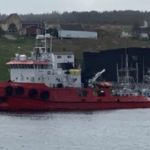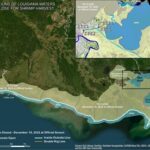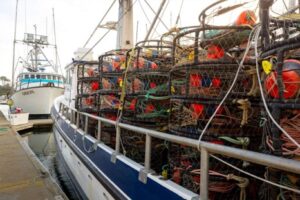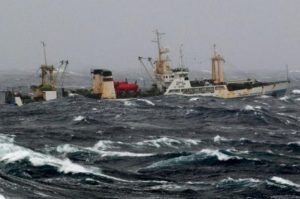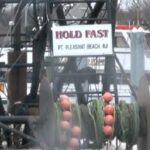Daily Archives: October 17, 2012
Menhaden were once so plentiful in the Atlantic that early pioneers described them as thick enough to hold up teams of oxen! Yessuh!
September 24, 2012 — Menhaden were once so plentiful in the Atlantic that early pioneers described them as swimming in schools twenty-five miles long or more, packing themselves into bays and estuaries where they came to feed on dense schools of phytoplankton (algae and vegetable matter). But those days are long gone. In the 1950s, the introduction of spotter planes and hydraulic technology to the fishery resulted in blowout years: 1.5 billion pounds of menhaden were caught in 1956, largely from the Chesapeake Bay and its environs. Ten years later, the catch had declined 70 percent, to 464 million pounds. The menhaden are currently at record low numbers.
At least according to Alison Fairbrother, director of the Public Trust Project. Through exaggeration and undocumented statements, Ms. Fairbrother presents selective and misleading facts about the menhaden fishery in her interview. This ultimately misconstrues their current status and misleads the public about the health of the fishery. Allison. Get off the pipe!
Extensive analyisis from saving menhaden fisheries
UFA Ready to Fill Executive Director Position – Fishermen’s News
For Seafood Landings, Port of Dutch Harbor Retains First Place – Fishermen’s News
National Ocean Policy: A New Bureaucracy That Could Compromise Regional Fisheries Management By Stephanie Madsen
The most disappointing aspect of the Obama Administration’s relationship with the Pacific Northwest/Alaska commercial fishing industry is its rigid and inflexible approach in creating a National Ocean Policy (NOP). In July 2010, President Obama issued Executive Order 13547, formally establishing an ocean policy, creating new councils and committees throughout the federal government, and directing agencies to undertake a broad array of new oceans-related activities.
While the fishing and fish processing sectors could embrace many aspects of the NOP initiative, several aspects of the NOP are so unpalatable that we cannot support the policy going forward ,,,,,,,,Read More
Mill River Dam Removal in ‘Herring Town’ Launches Regional River Restoration, gathering at the riverside Friday, Oct. 19 Taunton, MA.
For the first time in nearly 200 years, the Mill River winds its way through Taunton, providing natural habitat for fish and wildlife, and flood protection for local people. Over the past two months, the Hopewell Mills dam has been completely removed, and habitat restoration work continues at the site. “This is the first step in restoring an ecologically critical tributary to the Taunton River,” Mary Griffin, commissioner of the Massachusetts Department of Fish and Game.
Conservation and community leaders will gather at the riverside Friday, Oct. 19 to celebrate the successful dam removal and announce the next steps in the broader Mill River restoration effort, a partnership to remove three dams and construct a fish ladder and eel pass at a fourth.
WHERE On the banks of the Mill River, at the corner of Barton and Danforth streets in Taunton, MA. Tours of the project site will follow formal remarks.
WHEN Friday, Oct. 19, 2012, 11:00 am – 12:30 pm
http://boston.citybizlist.com/contributed-article/hopewell-mills-dam-removed-fish-passage-restored

SMAST professor Brian Rothschild, and the SMAST Team are coming to the rescue! (There is a God!) It ain’t NOAA either.
http://www.youtube.com/watch?v=oHSkMwUa2i4
I’m willing to bet my sou’wester that the SMAST Team will get some real results that the industry can believe.
SMAST plans independent groundfish survey to assist groundfishermen By DON CUDDY
DARTMOUTH — Frustrated by doubts surrounding the accuracy of fish stock assessments conducted by NOAA and with the groundfish industry in crisis, UMass Dartmouth’s School for Marine Science and Technology plans to launch an independent survey of groundfish stocks. “(NOAA Fisheries) is saying they don’t have time to review the assessments that are on the table,” said SMAST professor Brian Rothschild. “But this is really high stakes and we need to do something before May 1.” The new fishing year, with cuts of 50-70 percent projected for key stocks, begins May 1. Such drastic cuts threaten to force many independent fishermen out of business.
http://www.southcoasttoday.com/apps/pbcs.dll/article?AID=/20121017/NEWS/210170334
UNCLOS: Senate ratification is optional?
I’ve always believed that UN treaties could not be implemented in the USA without Senate ratification? What’s up with this?
Apparently NOAA disagrees with waiting for US Senate ratification of the UNCLOS (aka the law of the sea treaty):
As a matter of national and economic security and international leadership, the U.S. follows the U.N. Convention on the Law of the Sea. This law establishes claims of territorial waters and universal legal controls for the management of marine natural resources and the control of pollution.
Editorial: Affront to justice on fishing report demands criminal probe Gloucester Daily Times
Congressman John Tierney is certainly right to continue to step up the push urging Acting Commerce Secretary Rebecca Blank to release the extended special investigator’s report citing 66 case studies of likely
enforcement abuses by NOAA officials on the fishing industry, as he did in a letter last week.
Yet he, Senators Scott Brown and John Kerry and other Massachusetts federal lawmakers should be well aware by now that neither Blank, NOAA chief administrator Jane Lubchenco, or — therefore, by extension — the Obama White House gives two hoots what any lawmaker says or does regarding the second report culled and filed seven months ago now by retired judge and former Massachusetts Ethics Commission chief Charles B. Swartwood III. And it’s clear that Blank and the ever-defiant Lubchenco have no intention of releasing a report without doctoring it,,,,,,,,,,Read More http://www.gloucestertimes.com/opinion/x1684127207/Editorial-Affront-to-justice-on-fishing-report-demands-criminal-probe


































